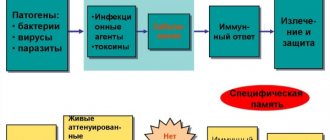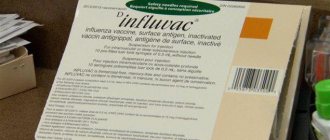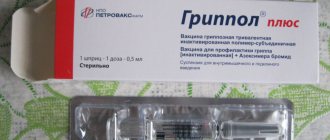Today, a method has been developed to “train” the immune system, in which nothing threatens the body - this is vaccination. The essence of the procedure is simple - weakened microorganisms are given to the immune system for slaughter, on which this same immunity learns to fight the “infection”. And this is where a lot of questions begin.
The fact is that vaccines are different, and so are organisms. Not every baby (after all, vaccinations are prescribed from a very early age) tolerates vaccination well, and not every vaccine is suitable for a particular child. The DPT and Pentaxim vaccinations made the most noise about this. What kind of vaccines are these, what is their difference and why there is so much talk about them - let’s figure it out in order.
Domestic vaccine
The most sensational among parents is the domestic DTP vaccine . This vaccination protects against diseases that can either kill the baby or lead to irreversible consequences for his health and usefulness:
- whooping cough;
- diphtheria;
- tetanus.
The vaccine contains:
- a suspension of killed pertussis microbes;
- purified diphtheria toxoid;
- purified tetanus toxoid.
All these pathogenic microorganisms are sorbed on aluminum hydroxide gel and “float” in the preservative merthiolate, which prevents them from multiplying, but, at the same time, preserves them in the state necessary for developing immunity to them.
This vaccine has been tested by time and more than one generation , despite all its side effects, which, unfortunately, are somewhat more common than pediatricians would like. However, its effectiveness has been proven by our grandmothers and parents. But it is precisely because of these undesirable effects that today experts are persistently developing analogues of this vaccine that have fewer of these same effects.
Pentaxim
The most popular analogue of the DPT vaccine is the French Pentaxim vaccine. Its spectrum of action is somewhat wider, it provides protection against the following diseases:
- whooping cough;
- tetanus;
- diphtheria;
- polio;
- hemophilus infection.

The composition of the drug Pentaxim includes:
- diphtheria toxoid;
- tetanus toxoid;
- pertussis toxoid;
- polio viruses types 1, 2 and 3;
- hematophilic infection polysaccharide combined with tetanus toxoid.
Excipients are:
- aluminum hydroxide;
- Hanks medium;
- water for injections;
- phenoxyethanol;
- formaldehyde;
- acetic acid;
- sucrose.
These substances are necessary to ensure that the vaccine elements do not multiply, but at the same time, remain in a state sufficient for an immune response. The Pentaxim vaccine has recently been gaining popularity, and there are reasons for this. This foreign analogue of the old DPT drug is preferred by more and more mothers, fathers and pediatricians.
Pentaxim and Infanrix: differences in schedule and vaccination schedule
When choosing a drug for vaccination, you need to pay attention to the difference in vaccination regimens recommended for different formulations, and to the advisability of introducing certain antigens at a specific age.
The immunization schedule with the Pentaxim vaccine differs from that recommended for Infanrix Hexa.
The English-made vaccine (Infarix Hexa) is administered in three stages, maintaining an interval of 1.5 months, followed by revaccination, depending on the age of the child. Standard scheme:
- at 3 months;
- at 4.5 months;
- at 6 months;
- revaccination – after 18 months.
With strict adherence to this vaccination schedule, unwanted complications can be completely avoided.
The use of Pentaxim can also begin at 3 months. The interval between vaccinations should be 1-2 months. Revaccination is carried out after a year and a half. If the standard schedule is violated for any reason, then subsequent vaccinations are given according to the following scheme.
- The first and second vaccinations are given between 6 and 12 months. The third injection is given without lyophilisitis; revaccination in this case is carried out using all components of the drug.
- After a year, the first injection can be given with a vaccine that includes all components. Subsequent vaccinations are done without using the component that protects the child from Haemophilus influenzae.
When drawing up an individual vaccination schedule with one or another analogue, you should definitely consult with the pediatrician observing the child.
DTP or Pentaxim - what's the difference?
The key difference between the two drugs described above is in the composition . The domestic vaccine gives the child protection against three diseases, while the foreign Pentaxim protects against five.
But the most important thing is that DTP contains, although killed, whole cells of pertussis infection, while Pentaxim contains only fragments of cells. It is the cell membrane of this “infection” that is most pathogenic, and it is to it that the body reacts most strongly.
In addition, there is a difference in price . DTP is cheaper, most often children are vaccinated with it free of charge, as part of the vaccination schedule. And in most cases, parents have to buy imported Pentaxim themselves, and at a rather steep price. But is it possible to save on a child’s health? No.

Although Pentaxim has fewer side effects than the domestic vaccine, this is an advantage only in terms of parental comfort, but in terms of immunology it is rather a disadvantage, and here DPT definitely wins.
Are vaccines interchangeable?
Every parent should be guided by several principles and take into account that the child’s health is above all. The next important “commandment” is: do no harm! All of these vaccines can be replaced with similar ones, and if necessary, there is no point in injecting the same one that was administered the first time. At the same time, do not forget to consult a doctor.
But when replacing the drug, one must take into account that their composition is different, and instead of a three-component one, a pentavalent vaccine will be offered, which will provide protection against polio. Accordingly, the vaccination schedule will change. This should be done if the child has already had a severe reaction to DTP the last time.
Love children, take care of them and make your choice correctly: after all, the baby’s health is always more important than the financial issue or support for domestic products.
Disadvantages of Pentaxim and DTP
The main disadvantage of DPT is a whole range of side effects associated with the child’s well-being. These include:
- local reaction in the form of hardening and irritation of the area of the thigh where the injection was given;
- general allergic reactions;
- temperature increase;
- causeless prolonged crying;
- temporary paralysis of the leg into which the injection was made;
- other.

Of course, exactly the same reactions are possible when using Pentaxim, but they are much less pronounced and occur much less frequently . But it’s all about the same composition of vaccines. Yes, the cell membrane of pertussis infection is especially pathogenic; it is the one that carries with it all the side effects. Therefore, a foreign vaccine is more loyal to the child’s body in terms of undesirable effects. But this is the main drawback of Pentaxim - fewer antibodies are produced in the child’s blood, and they are much weaker in terms of effectiveness than those that the body creates when encountering DTP.
In addition, additional antigens included in the imported drug require the use of more preservatives. And although they are completely safe for the child’s health, the risk of the body reacting incorrectly to them, and not to pathogens, increases significantly.
Repeated vaccination
Many parents are concerned about at least one of the following questions:
- Is it possible to put Pentaxim after DTP?
- Is it possible to do regular DTP after Pentaxim?
So, you can do both, and do it completely calmly. In some cases, this approach is even justified:
- If after domestic vaccination the adverse reactions were too severe . No matter how much the baby suffers in the first days after DPT, revaccination should not be skipped under any circumstances. Believe me, in the event of a real illness, the child will suffer much more severely and for longer. But if the reaction to a conventional vaccine is not within any framework, it is better to vaccinate again with a foreign drug, after consulting with a doctor.
- If the child tolerated the Pentaxim vaccination very well . Now his immune system is much better prepared, so it should be able to cope with the free domestic drug without any problems. And the process of forming immunity from the three most terrible diseases will make this trick significantly cheaper.
- If you have had an allergic reaction to any component of the vaccine . Both vaccinations are interchangeable; if you are allergic to one, it is better to replace it with another, naturally, after preliminary consultation with a pediatrician.

DTP vaccine from a domestic manufacturer

Every mother goes through a period when the baby reaches three months of age. The time has come - we need to vaccinate. If there are no questions or contradictions, the baby will be administered the Russian adsorbed pertussis-diphtheria-tetanus vaccine. It is publicly available and is free for parents.
What is it and why do you sometimes have to choose between a domestic drug and its imported analogues?
Created to build immunity in a child from the three listed above. In products from foreign manufacturers, the pertussis component is included separately; if necessary, it is administered in one syringe. It is this component that mainly causes a lot of trouble, causing a lot of side effects. The DPT vaccine contains live, weakened pertussis bacteria.
Plus, it’s multi-component. It requires the child’s organs and tissue structures to work hard, aimed at activating the immune system.
The DPT vaccine contains formalin and merthiolate as additional substances. All this, in combination with cellular components, can cause adverse reactions:
- temperature;
- hives and other forms of rash;
- Quincke's edema;
- general intolerance reactions.
How else is it different from foreign ones? Components against polio and Haemophilus influenzae are not included. Thus, the child will need to be vaccinated additionally. This means more injections and, therefore, additional stress for the baby.
Alternatives
It also happens that the child’s body does not tolerate both vaccinations well, or he is allergic to both types of vaccines. In this case, you should look for other alternatives, because completely refusing vaccination can have very serious consequences in the future. Some of the most common alternative drugs are:
- Infanrix Hexa;
- Infanrix;
- Hiberix;
- Tetrakok;
- Bubo Kok.
But before choosing an alternative to DPT or Pentaxim, you should definitely consult with your pediatrician. Each drug is good in its own way, but despite the similarity in composition, it is not easy, and sometimes even impossible, to predict the child’s body’s reaction to a specific vaccine.
Is it possible to put Pentaxim after DPT or vice versa?
Doctors believe that it is impossible to administer Pentaxim instead of DPT during primary vaccination. It is necessary for the child to develop basic immunity. Therefore, for the first vaccination, whole cell vaccination is taken. At the same time, revaccination is provided at 6-7 years of age, which is already done with acellular pertussis vaccine, for example, with Pentaxim, as the safest remedy.
You cannot use an acellular vaccine from the very beginning, otherwise you will have to do more vaccinations, which is also harmful.
Both drugs are used to prevent the disease. But there is order. First - DTP, with repeated vaccination - Pentaxim. Other drugs in these same categories are considered less effective, but these 2 can be considered the gold standard.
DTP or Pentaxim - reviews from parents
Of course, you should not rely on reviews about the drug alone, but it is at least wrong to neglect the experience of parents who are familiar with at least one of the vaccines. We have collected different opinions on both vaccinations:
Alla, 31 years old:
I have two kids - one is one year old, the second is almost three. The eldest was given DPT, everything was as it should be, according to the calendar. There was a side effect. And the leg did not obey for the first day, and I had a temperature, but I would not say that everything was as critical as some parents say. But the youngest was less fortunate - the reaction to a regular vaccination did not fit into any framework at all, the temperature was below 40, he screamed for two hours without stopping, he suffered. Switched to Pentaxim. And here there were no consequences, so, as they say, who cares what.
Rita, 28 years old:
We, like all decent people, got all the vaccinations. Until it came to whooping cough-diphtheria-tetanus domestic disaster. The reviews basically scared me, I decided not to risk it and bought Pentaxim. We have already been vaccinated three times, and thank God we are all successful. The doctor just gave us an injection, we whimpered for five minutes, and we went for a walk in the park. Without fevers and all the horrors that are said about other vaccines. So I recommend it from personal experience.
Olga, 25 years old:
I don’t know what the problem with DTP is generally. The doctor and I were afraid that the vaccine was difficult, and my friends tried to dissuade us. Then the pediatrician simply prescribed an anti-inflammatory drug for the baby to drink three days before the vaccination, and three days after. And at least that's it. On the first day, my girl’s leg itched a little, the injection site hurt, it was reddish. That's all. No sky-high temperatures, no torment. Of course, I won’t recommend it - maybe we were just lucky, but I don’t see the point in spending money on imported drugs.
Irina, 27 years old:
We deliberately intended to give our son Pentaxim. They found the first vaccination with grief and bought it. There were no consequences; the vaccine in this regard is very good. But for the second vaccination they simply didn’t find it, so I had to take a risk and give DPT. This is quiet horror. The temperature is 38-39, the child screams, arches, the leg does not move. Of course, we suffered through fear. But fortunately, on the third day everything went away on its own. A terrible vaccine, some kind of simple abuse of children.
Alena, 34 years old:
When I gave birth to my little one, almost no one knew about analogues of the domestic drug. They did it and endured it. Anything could happen, my girl had a fever, and her leg hurt, but, I must say, after the third revaccination everything went very calmly. For our little one, the question was already on the table, because Pentaxims, Infanrixes, and so on appeared. But, to be honest, I didn’t take any risks. We already know what to expect from DPT, and we probably got a good batch; it didn’t go beyond temperature and compaction on the stem. In general, parents must decide for themselves. Much also depends on the child’s health status.
Video: what is the difference between vaccines
In this video, the pediatrician talks about the domestic vaccine and its analogues - Pentaxime and Infanrix Hexa. General information is given on each injection and the features of replacing one drug with another.
The main task of the immune system is to respond to any environmental factors and maintain harmony in the body. It is this system that helps a person live in the changing conditions of our planet in symbiosis with many microorganisms, while at the same time repelling the attacks of those microbes that do not want to live in the world with us. Bacilli, in turn, do not sleep, improving their “attack” abilities in tandem with viruses. As a result, we have the fact that every day there is a war invisible to us between the defense of our body and pathogenic agents.
Everything would be fine, but some “infections” in the process of evolution have become so aggressive that no normal immune system can cope with them. And he doesn’t know about such diseases until he encounters them in direct combat. But in this case, very often it may be too late - the body will die before the immune system develops effective battle tactics. Therefore, we can really say that vaccination is necessary, vaccination is important.
Whooping cough, diphtheria and tetanus are not what a child should encounter in life, believe me. Despite any stories about killer vaccines, a child should be vaccinated in any case. Whether it’s DPT, or Pentaxim, or any other vaccination, the body can react calmly, or maybe violently, it all depends solely on the individual child. The choice of drug, in any case, remains with the parents, naturally, after consultation with a pediatrician. The main thing is that at the time of vaccination the baby is healthy, then any injection will be tolerated without noticeable inconvenience.
If you have vaccinated your baby with at least one of the drugs, be sure to share your impressions in the comments .
There are as many reactions to vaccination as there are organisms; your personal experience will help young mothers and fathers navigate the choice of vaccine for their baby. Easy vaccinations and healthy children!










